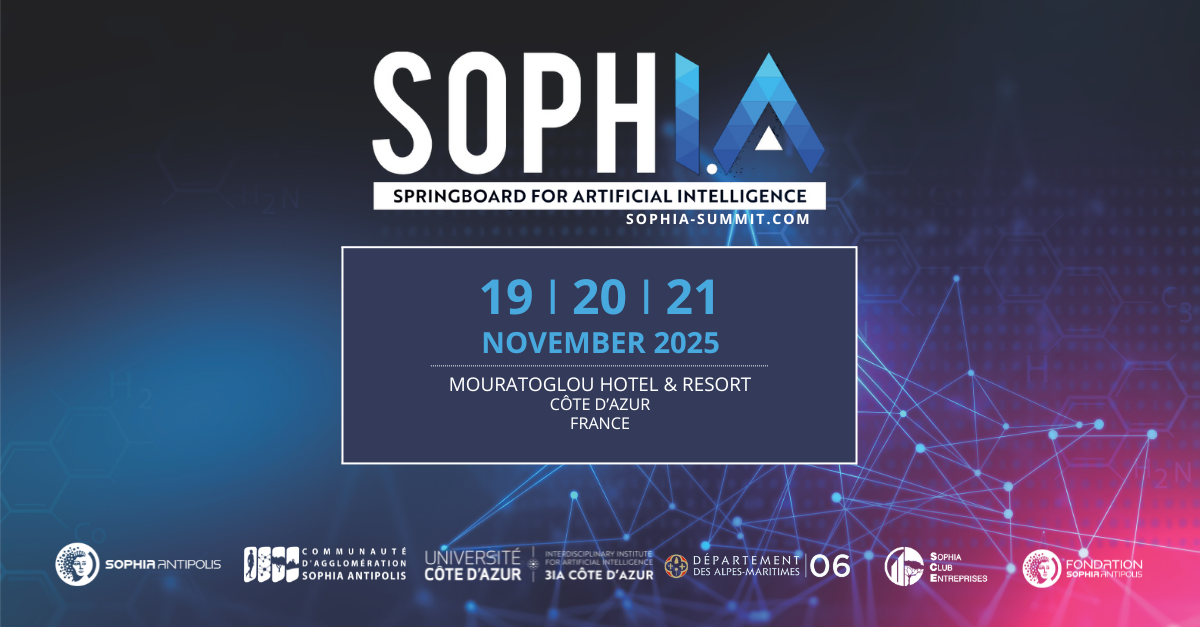The institute
The new edition of the international AI conference, SophI.A Summit, will take place from 19-21 November at Sophia Antipolis Technology Park on the French Riviera, to reveal the latest advances in the field of artificial intelligence and its applications.
This event brings together global AI experts, in biology, health, mobility and smart applications, covering both core technology and its applications who will present their work through meetings, debates, round tables and posters.
The SophI.A Summit gathers the best AI specialists in the world. During 3 days, we want to offer researchers working at the cutting edge of AI the opportunity to consolidate their technical knowledge and meet recognized experts. Together, we need to articulate a vision on how to create sustainable, economically and socially controllable AI.
Program
- Wednesday November 19
-
09:00 am - 09:15 am | Introduction
09:15 am | AI, economics, and management (Chairs: Simone Vannuccini & Pierre-Alexandre Mattei)
09:15 am - 10:00 am | "The AI value chain: corporate power, technological dependencies and extractivisms" by Cécilia Rikap
10:00 am - 10:30 am | "Bridging Science, Technology, and Industry in AI: Integration as a Path to Technological Sovereignty in Europe" by Ludovic Dibiaggio
10:30 am - 11:00 am | Coffee Break
11:00 am - 11:30 am | "What happens after the AI bubble bursts? Lessons from the economics of technological change" by Simone Vannuccini
11:30 am - 12:15 pm | "Fireside chat on AI and Education" by Ludovic Dibiaggio with Frédérique Vidal & Lucile Sassatelli
12:15 pm - 01:45 pm | Lunchtime
01:45 pm | AI & respiratory health (Chair: Maxime Sermesant)
01:45 pm - 02:30 pm | "Exploration of AI Capacities for Quantitative Emphysema Biomarkers on Lung CT Scans" by Elsa Angelini
02:30 pm - 03:05 pm | "Mechanistic learning to predict response and survival in immuno-oncology" by Sébastien Benzekry
03:05 pm - 03:35 pm | Introducing the IHU RespirERA
03:35 pm - 04:00 pm | Coffee Break
04:00 pm | AI & molecules (Chair: Frédéric Cazals)
04:00 pm - 04:45 pm | "Why are inverse folding models good zero-shot predictors of protein thermodynamic stability?" by Jes Frellsen
04:45 pm - 05:20 pm | "Mapping Context-Specific Axitinib Resistance via Multi-Omics and Explainable AI" by Jaspreet Kaur Dhanjal
05:20 pm - 05:55 pm | "Drug-like Property Prediction for Small Molecules: Comparing the Performance of Physics-based, Data-driven, and Quantum-inspired Machine Learning Models" Arul Murugan
05:55 pm | AI for personalized medicine (Chairs: Fabien Lareyre & Fabien Lastic)
05:55 pm - 06:30 pm | "AI and Simulation for Patient-Specific Vascular Treatment" by Elie Hachem
06:30 pm - 07:05 pm | "Ensemble models for understanding patient heterogeneity in the ICU: Towards Physician-Centric AI" by Mayank Garg - Thursday November 20
-
09:00 am | Deploying AI systems in the real world (Chair: Pierre-Alexandre Mattei)
09:00 am - 09:35 am | "Building AI to make travel better" by Eoin Thomas
09:35 am - 10:10 am | "AI for Software Vulnerability Management: Use Cases and Challenges" by Merve Sahin
10:10 am - 10:25 am | "The Next Frontier for European AI: Bridging Deep Research with Specialised Skills" by Federico Menna
10:25 am - 10:55 am | Coffee Break
10:55 am - 12:10 pm | "Steering Foundation Models: What Works and Why" by Damien Garreau
12:10 pm - 01:45 pm | Lunchtime
01:45 pm | AI for natural language & music (Chairs: Elena Cabrio & Jean-François Trubert)
01:45 pm - 02:30 pm | Claire Gardent
02:30 pm - 03:00 pm | Coffee Break
03:00 pm - 03:45 pm | François Pachet
03:45 pm | Computer vision (Chair: Diane Lingrand)
03:45 pm - 04:30 pm | "Understanding and monitoring internal representations of Multimodal-LLMs" by Matthieu Cord
04:30 pm - 05:05 pm | "Generation and detection of deepfakes" by Antitza Dantcheva
05:15 pm - 07:00 pm | Poster session - Friday November 21
-
09:00 am | Deploying AI systems in the real world (Chair: Pierre-Alexandre Mattei)
09:00 am - 09:35 am | "Kyndryl’s Cloud-Edge Hybrid Environments AI deployment: Optimizing Inventory and Quality Inspection for Cost-Effective, Secure Decisions" by Yves Darnige
09:35 am - 10:20 am | "Embedded Intelligence at the Edge: From MCU Hardware to Use Cases" by Lennart Bamberg
10:20 am - 10:30 am | Launch of the Med'Innov Digital Network by Anthony Schoofs
10:30 am - 10:55 am | Coffee Break
10:55 am | AI for smart territories (Chair: Hongliu Cao)
10:55 am - 12:10 pm | "Leveraging AI and Multi-Source Data to Transform Mobility Studies" by Latifa Oukhellou
12:10 pm - 12:45 pm | Cédric Richard
Scientific committee
Michele BezziFrançois Bremond
Elena Cabrio
Hongliu Cao
Ludovic Dibiaggio
Diane Lingrand
Pierre-Alexandre Mattei
Laurent Pilati
Remy Pottier
Maxime Sermesant
Simone Vannuccini

